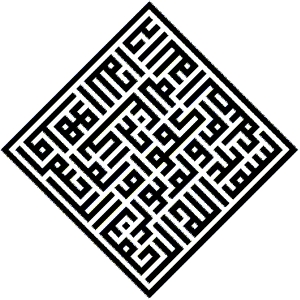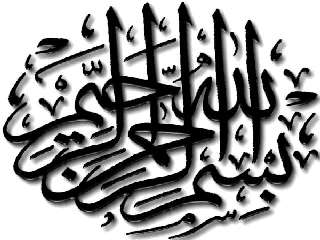Das Verb basmala بسمل bedeutet diese Formel aussprechen oder zu schreiben.
Bismillahi-r-Rahmaani-r-Rahiim
Im Namen Allahs, des Gnädigsten, des Barmherzigsten
Jede der 114 Suren des Qur'aan beginnt mit der Basmallah بسملة, mit Ausnahme von Suuratu-t-Tauba; in Suuratu-n-Naml (27.30) erscheint die Basmallah aber ein zweites Mal in einem Brief des Propheten Sulaimaan an die Königin von Saba).
Sagte
z.B.
M. Karam Shah: "Unser Führer
Muhammad
Die zwei Namen
Allahs
Ein Tier, welches ohne bismillah zu sprechen
geschlachtet wurde, darf nicht verzehrt werden. Beim Schlachten
eines Tieres, wird allerdings nur bismillah ohne
Ar-Rahmaan und Ar-Rahiim gesprochen, denn das
sind die zwei Namen bzw. Eigenschaften, welche für Allahs
Es gibt zahlreiche kunstvolle Schreibweisen der Basmallah
Im Koran fehlt die Basmala vor Sure 9, erscheint aber in Sure 27 ein zweites Mal in Vers 30 als Eröffnung eines Briefes von Sulaimaan (alaihi salaam) an die Königin von Saba.
Die Bedeutung von
"Bismillahi-r-Rahmaani-r-Rahiim"
... im Tafsīr ʿAbd al-Razzāq
al-Kaashaanii
In the Name of God: The name of a thing is that by which it can be known. The Names of God, exalted be He, are the [arche]typal forms (ṣuwar nawʿiyya) whose specificities and ipseities (hūwiyya) indicate the attributes of God and His essence, and [which indicate] by their very existence His countenance, and by their individuation His oneness. For, these are the outward manifestations through which He can be known; Allāh is a name for the divine essence qua essence absolutely, without taking into consideration that it may be qualified by the attributes or indeed taking into consideration that it may not be [so] qualified; the Compassionate, is the one who causes existence and perfection to flow upon all [things] in the measure that [divine] wisdom requires and to the capacity of the receiving entities (qawābil) from the outset [of their creation]; the Merciful: (al-Raḥīm) is the one who bestows the spiritual perfection (kamāl maʿnawī) that has been earmarked for the human species in the end [sc. in the Hereafter]. It is for this reason that they say O [You Who are the] Compassionate One of this world and of the Hereafter (yā raḥmān al-dunyā wa’lākhira), but [say] O Merciful One of the Hereafter (raḥīm al-ākhira): the meaning then is, in the perfect human all-encompassing form, general and specific mercy, which is the locus of manifestation of the divine essence and the greatest truth with the totality of attributes, I commence and I recite. It [Allāh] is the Greatest Name [of God]. It is to this meaning that the Prophet’s (ṣlʿm) alluded when he said, ‘I have been given the sum of all [excellent] speech [sc. The Qurʾān] and have been sent to complete the noble character traits (makārim al-akhlāq). For words constitute the realities (ḥaqāʾiq) of existents (mawjūdāt) and their concrete substances (aʿyān), just as Jesus, peace be upon him, was called a Word from God [cf. 3:39,45]. The noble character traits are the perfections [of these existents] and [represent] their specifities, constituting the sources of their [the existents’] actions in their entirety, contained as they are in the comprehensive human microcosm (kawn insānī). Herein lies a subtlety (laṭīfa), namely that the prophets, peace be upon them, have made the letters of the alphabet analogous to the ranks of existents (marātib al-mawjūdāt). I have found in the statements of Jesus, peace and blessings be upon him, and of the Commander of the Believers ʿAlī [b. Abī Ṭālib], peace be upon him, and of some Companions what indicates [the truth of] this.
In effect, that is why they say that existents were made manifest through the [letter] bāʾ of bismillāh (In the Name of God), since it is the letter that comes after the alif which [itself] is analogous to the Essence of God. Thus it [the bāʾ] is an allusion to the First Intellect (al-ʿaql al-awwal), which is the first thing that God created and the one to whom God’s statement, “I have not created anything more beloved to Me or more noble in My eyes than you: through you I grant, through you I seize, through you I reward and through you I chastise” is addressed [as per] the ḥadīth. [You will note that] the uttered letters in this statement are 18,7 the written ones 19, and if the words were separated the letters would amount to 22. The 18 are allusions denoting the 18,000 worlds. For ‘thousand’ is a complete number subsuming all the other levels of numbers, and is as such the foundation of all [numerical] levels, higher than which there is no number. [The letters] thus are used to denote the mothers/foundations of all worlds (ʿawālim), namely, the world of power (ʿālam al-jabarūt), the world of the heavenly kingdom (ʿālam al-malakūt), the throne (ʿarsh), the seat (kursī), the seven heavens, the four elements and the three [natural] kingdoms (mawālīd),8 each of which subdivides into its constituent parts; the 19 letters are allusions to these together with the world of humankind, for even if this [latter] belongs in the animal world, it, on account of its eminence (sharaf)9 and its subsuming of both [the animal and the human] and its comprising of existence, it constitutes another world [in its own right], one with its own affair, a genus sui generis, with its own demonstrative proof (burhān), such as Gabriel from among the angels where God says, and His angels… and Gabriel [Q. 2:98]. The 18 pronounceable letters in this statement are hamza, alif, ḥāʾ, yāʾ, bāʾ, wāw, kāf, ʿayn, dhāl, mīm, khāʾ, lām, qāf, tāʾ, rāʾ, nūn, ṭāʾ, thāʾ. Literally, ‘the three offspring’: these are the mineral, the plant and the animal (including humans). Cf. Q. 17:70. According to Ibn ʿArabī, ‘Man possesses an eminence over everything in the heaven and earth. He is God’s sought-after goal among the existent things, since it is he whom God has taken as a locus of self-disclosure […].’ (Chittick 1989, 368). The three hidden alifs, which complete the 22 [letters] upon separation, are an allusion to the true divine world in terms of the Essence, the attributes and the acts. These then are three worlds at the point of differentiation (tafṣīl), but one when at that of realisation (taḥqīq). The three written ones are an allusion to the manifestation of these worlds in the supreme human form. And on account of the veiling of the divine world when the Messenger of God, may God bless him and grant him peace, was asked about the alif of the [letter] bāʾ, how was it that it went away, he replied, ‘Satan stole it’, and he was commanded to elongate the bāʾ of bismillāh to compensate for its [stolen] alif, an allusion to the veiling of the divineness of the divinity in the form of diffusional mercy (raḥma intishāriyya) and its manifestation in human form such that only those who are worthy will recognise it. That is why it [the alif] has not been written in. Indeed, in the ḥadīth it is said that God, exalted be He, created Adam in his form. Thus the [divine] Essence is veiled by the attributes, the attributes by the acts, the acts by the engendered things (akwān) and the effects of these engendered things (āthār [kawniyya]). The one to whom the acts are disclosed by the lifting of the veils of the engendered things, he trusts [in God]. The one to whom the attributes are disclosed by the lifting of the veils of the acts is satisfied and submits. The one to whom the Essence is disclosed by the unveiling of the veils of the attributes is annihilated in the Unity and becomes an absolute affirmer of the Unity absolutely, doing what he does and reciting what he recites ‘in the Name of God, the Compassionate, the Merciful’. The declaration of the unity of the acts then precedes the declaration of the unity of the attributes and this [the latter precedes] the declaration of the unity of the Essence. To these three he [the Prophet], may God’s blessings be upon him, alluded when he would prostrate and say, ‘I seek refuge in Your pardon from Your punishment, and I seek refuge in Your satisfaction from Your wrath and I seek refuge in You from You.
Beispiele für die Basmallah in Khatdtd (Kalligraphie)
|










